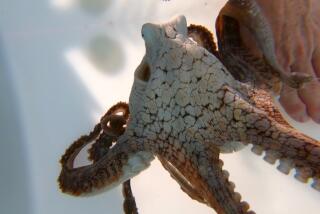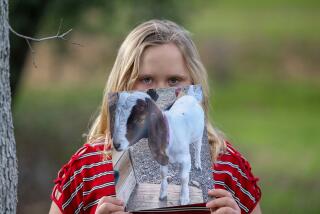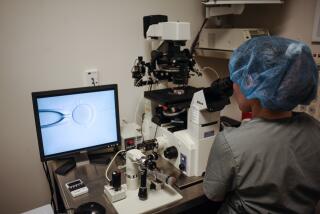Judge Jumps to Conclusion: Find Naturally Dead Frog
- Share via
Any way you looked at it, it was a dilemma.
On one hand, there was 16-year-old Jenifer Graham, who told her biology teacher at Victor Valley High School last year that dissecting a frog would be a little like killing “the God in everything.”
Then there was the school district, which maintained that a frog was a frog, and if Jenifer wanted a passing grade in her biology class, she’d have to be able to tell the aorta from the shin bone in at least a photographic representation of a frog.
Impromptu press conferences, school board confrontations and a few demonstrations by animal rights activists ensued. By the time Jenifer’s lawsuit against the school district reached U.S. District Judge Manuel Real’s courtroom Monday, both sides agreed that it had virtually sprouted hind legs of its own.
But Judge Real left both sides blinking a bit when he proposed a final solution to the dispute: a dead frog, as the school district insists, but a frog that has died of natural causes and not in a laboratory formaldehyde jar.
“You can’t take this to absurdity, counsel. The Constitution was not meant to be absurd,” an impatient Real said in an order dismissing Jenifer’s lawsuit.
Under Real’s proposed stipulation, Jenifer will be allowed to make up her biology laboratory grade by identifying photographs of a deceased frog plucked from wherever it is one finds frogs whose time has run out.
Jenifer’s lawyers remained skeptical, suggesting that most frogs found dead in the wild would likely be too decomposed to use as photographic lab specimens.
“If they’re talking about road kills, there’s not much left,” mused one of her attorneys, Jodi Clary.
But lawyers for the school district, perhaps cognizant of the weight one ought to give a proposal when it comes from the chief U.S. district judge, pronounced it “an excellent idea.”
“If we have to station somebody down at the swamps or wherever it is they live to see them die, we’ll do it,” asserted attorney Joseph Arias, representing the high school.
“Frogs don’t live very long, anyway,” added his partner, Christopher D. Lockwood.
New Dissection Law
The dismissal of the lawsuit came after passage of a new state law that allows students to be excused from lab dissections if they object on religious or moral grounds.
The new law takes effect Jan. 1, but school officials offered to apply it retroactively in Jenifer’s case. The lawsuit dragged on because lawyers could not agree on how Jenifer could make up her biology lab grade, which continued to reflect her refusal to complete the dissection requirement.
Jenifer suggested using a computer simulation or a three-dimensional model of a frog; school officials said using a model would give Jenifer an unfair advantage over students who had to identify body parts from an actual specimen.
Lawyers for Jenifer, a vegetarian who has said that “what goes on inside a dead animal is irrelevant to me,” told the judge they would have to consult Jenifer to determine whether a frog that has died of natural causes would be acceptable--assuming they can verify the manner of the frog’s demise.
Said lawyer Roger Kindler: “These are matters of conscience, not dollars and cents.”
More to Read
Sign up for Essential California
The most important California stories and recommendations in your inbox every morning.
You may occasionally receive promotional content from the Los Angeles Times.










